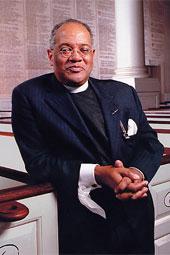Advertisement
More On Stroke And Speech

Meanwhile, as promised, Spaulding Rehabilitation Hospital put me in touch with a leading stroke rehabilitation specialist.
Dr. Randie Black Schaffer is the director of the Stroke Rehabilitation Program at Spaulding. She is not involved in Rev. Gomes's care and cannot speak about his case specifically, but she explained the general outlook for recovery when a stroke patient has speech impairment:
"It depends on exactly where in the brain the stroke takes place and how much of the brain is involved. The smaller the area, the more likely the person is to get a complete recovery. And some areas of the brain are more forgiving than others in that some areas are more redundant.. For some functions, including motor function speech, analogous areas in the opposite hemisphere of the brain can learn to take on some of the function of the damaged area.
Immediately after you have a stroke, there is a small area of brain tissue that’s actually destroyed by the stroke, and an area of brain around it that's called the penumbra. This is like a rim around the central area of the stroke where the tissue is still viable but not functioning because of swelling and inflammation. As the inflammation goes away, that area can recover. That usually takes one to three months, depending how big the stroke is and how much swelling there is.
The longer-term process is more a compensatory process in which you encourage the developing and reinforcing of new connections in the brain. That's the time when repetitive practice is important. You move into the 'piano lessons' model and you practice therapy exercises every day.
Two types of aphasia
Speech in the brain is centered in two different areas, and they correspond to two major types of aphasia that can be caused by stroke.
In one, comprehension is relatively preserved but the ability to formulate verbal responses is more seriously impaired. Patients have a hard time getting out the specific word they want to say.
In the other type, comprehension is more affected than verbal expression. Patients may be able to speak fluently but often make no sense. Typically, they don't have insight into how they're speaking, but the really important thing is that they may not understand what you're saying to them at all.
A third possible reason for speech impairment is that the stroke may have caused weakness in the throat muscles needed to speak clearly.
Therapy
As soon as the person is able to, he or she starts doing speech therapy. There’s evidence that early speech therapy is important. You don’t want to wait a month. You want to start working on a patient’s areas of language weakness right away. Recovery may be ongoing for a year or more. Usually the recovery is fastest in the first few months, but people may make meaningful gains in language function for a year or more.
Recent literature suggests that for the most part, more therapy is better. That certainly early on, daily therapy is important, up to one to two hours a day. And the patient has to be motivated and really actively engaged in the therapy for it to be useful.
This program aired on December 20, 2010. The audio for this program is not available.
